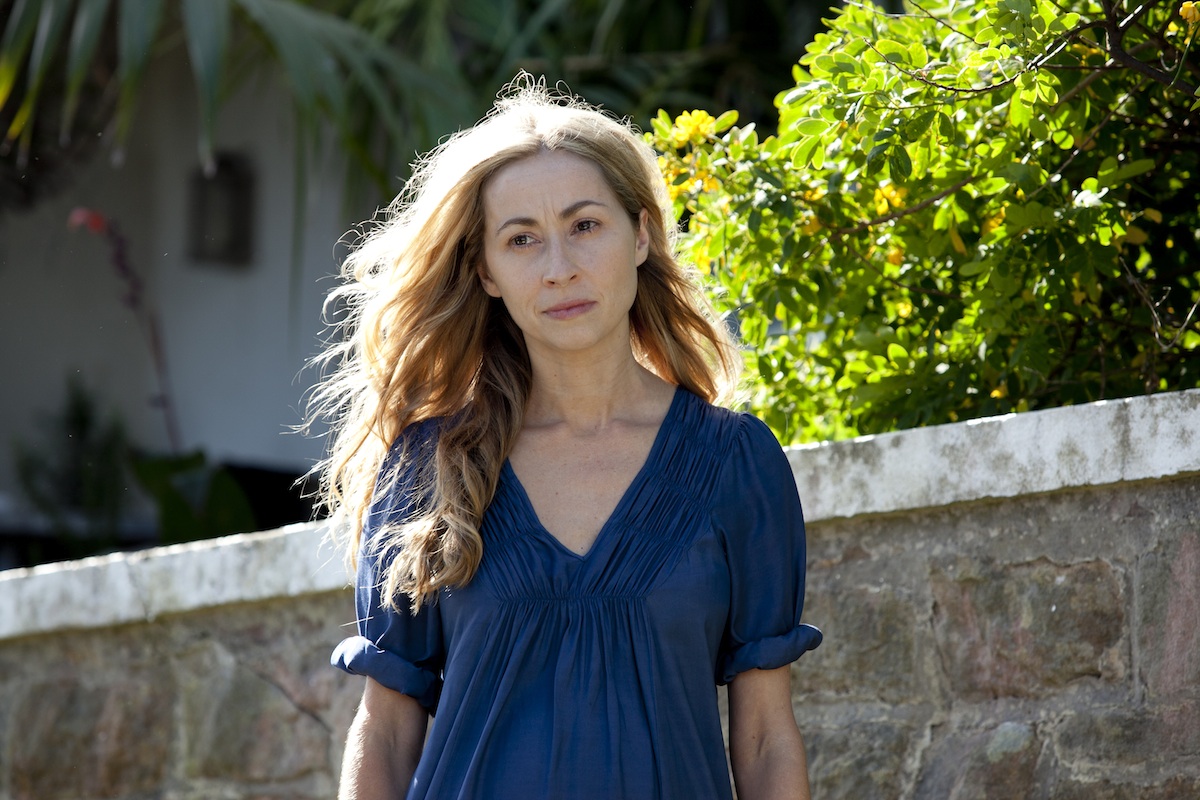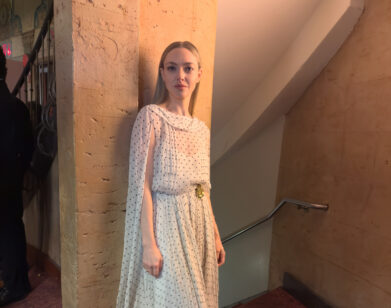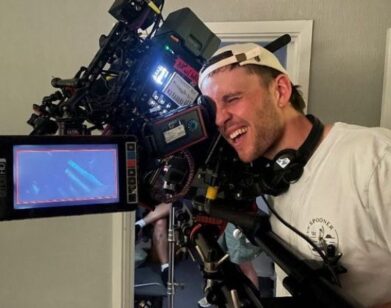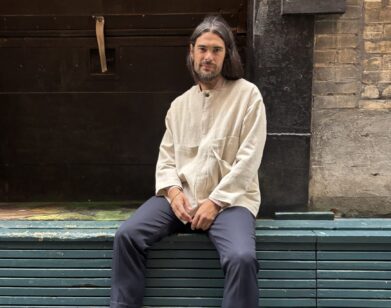Felicity Price on Location

ABOVE: FELICITY PRICE IN WISH YOU WERE HERE
Wish You Were Here‘s opening shot zeroes in on a couple, lazing about on a sandy white shoreline. Are they husband and wife away on a holiday idyll, or simply coy lovers flirting on the beach? The script is deliberately disorienting, in the way that good thrillers are, with unreliable narrators at the fore. Several years in the making, the movie is a family project: co-written by Australian actors Felicity Price and Kieran Darcy-Smith, who also happens to be the film’s director and Price’s husband. The narrative they’ve constructed unfolds like a Paul Bowles short story—Westerners arrive in a foreign land and suffer for wanting a break from their routine and a taste of the exotic. This is Price’s first produced screenplay, but her background as a theater actress clearly informed this elegiac film.
JEFFREY EDALATPOUR: I watched your movie last night and felt like I was watching a memory play captured on film. The editing between scenes moved so fluidly between the past and the present. In the writing, were you inspired by any particular approach to the handling of memory?
FELICITY PRICE: It’s great that you say that, because we wanted the film’s cuts to say that. The storyline occurs in Sydney once the people have come back from their holiday, but the story is affected by the past. We keep revisiting the past and find out more about the story. Because of the difference between the locales, between Sydney and Cambodia—Cambodia can seem dreamlike because it’s such an exotic and different culture. Perhaps that’s why it has that quality, but it’s nice that you say that because we always wanted to have a motivation for those cuts back to Cambodia. We didn’t want them to be random. So the film does toy with that idea of how things are remembered, but no, there wasn’t a specific influence necessarily.
EDALATPOUR: There’s a scene that takes place in what looks like Sydney’s equivalent to Chinatown. Dave (Joel Edgerton) has a panic attack, and the way it’s shot is eerily similar to the flashbacks.
PRICE: We had the idea of Dave experiencing a sense of post-traumatic stress disorder because of what happens in Cambodia and what he witnesses there with Jeremy (Antony Starr), and what he subsequently has happen to him because he’s threatened. We were shooting in that area, a suburb of Sydney called Campsie, a very multicultural part of Sydney. There are things in that environment that trigger him back. There’s an Asian guy on a motorbike who zooms past him and nearly knocks him off the sidewalk. He is triggered back into Cambodia and the trauma he experienced there.
EDALATPOUR: His character is doing such unlikeable things, and yet, I can’t help but like him and respond to his vulnerability.
PRICE: I know, it’s such a beautiful quality. Often it’s what people are looking for in male actors. Indeed, Joel is a big movie star now. It’s always been one of my favorite things on screen in a man, someone who can be manly, has a genuine masculinity, but you can really sense that beautiful sensitivity underneath. He has that in spades.
EDALATPOUR: Like many Australian films I’ve seen, there’s such an evocative sense of place, where the natural world, and the sea in particular, is another character that informs the narrative.
PRICE: Sydney is a beautiful city, and a lot of people there are lucky enough to live right on the water. The house where we shot in Sydney is this extraordinary house that was designed by a very good friend of ours. I had lived across the road from that house. It overlooks a beach called Tamarama. That’s pretty prime real estate, and we didn’t want our protagonists, our hero couple, to be super-rich, so we pulled back from the interior of the house. We were always very interested in depicting the harbor. David Williamson, an Australian playwright, once referred to it as the Emerald City, because much of it sits on this beautiful green harbor. The beaches are very clean, and you become used to an outdoorsy lifestyle, people are swimming year-round. Sometimes you’ll see a film—for me it might be from somewhere in Scandinavia—and the main house could be set on a cliff somewhere overlooking the water. You just take the beauty of that in. You don’t say: What kind of work do they do to be able to afford to live on that cliff? We wanted to have a sense of that in our film, of making it beautiful. People in Australia have seen the film and have said, Wow, they must be rich to live there, but internationally the audience can accept the beauty of the topography and accept that they’re not that wealthy.
EDALATPOUR: The house also works because of the close-up shots of the mess of their real life: kids’ toys and clothes and dishes. It looks like real people live there. And all the actors are hot and sweaty with disheveled hair.
PRICE: That’s what we wanted. We’re wearing very little make-up. It wasn’t my intention to be on-screen with very little make-up, [laughs] but that’s what Kieran—my husband, and the director of the film—his aesthetic was, really we’re going to be wearing no make-up, no blush, or a very small amount. Naturalism was very important to us.
EDALATPOUR: I wanted to ask about his directing: there’s a recurring visual pun of elephants. Was that in the script, or inspired by the shoot in Cambodia?
PRICE: That was in the script. The film is very close to the script. There are maybe one or two scenes that were taken out. And then one final flashback woven into the final edit. The script is very, very close to what you see on screen. And those elephants are a reminder of Jeremy. But you see the elephant souvenir at his parent’s place, and the one that Steph (Teresa Palmer) buys, and the real elephant in Cambodia. We hired that elephant in Phnom Penh for an afternoon and used it in a couple of shots in the film, so the real elephant wasn’t necessarily planned.
EDALATPOUR: Your script held a nice balance between spelling things out and withholding information by not locating the audience initially with specific dates or lower thirds.
PRICE: There are parts of the film, if you remember, where we don’t subtitle what the characters are saying. The Vietnamese mafia—towards the end—are speaking in Vietnamese, but we don’t subtitle it. You never know what they’re saying, but we wanted to put the audience in Dave’s position, where all these guys are screaming at him in this other language and he has no idea what they’re talking about, and they’re becoming very violent, and he just doesn’t know what’s going on. That was all intentional.
EDALATPOUR: I did really want one more scene between the sisters. Was anything like that cut from the final print?
PRICE: I know, I know. Look, we didn’t shoot anything, no. In the writing of the script, we had toyed around with how to put an end to the deft storyline. It’s really hard when you’re making a film. You want to include so much. You have to keep pulling things back, because we wanted a 90-minute film. Yes, we really played with all these different options. What is on screen is what we ended up with. There are a few people who have commented that they would have liked to see that storyline wrap up a little more. But I guess we felt that once the reveal has been made, the climactic emotional reveal, that the rest was denouement. Mainly we needed to see was an emotional ending between the characters of Alice and Dave. This is the main story, and this is the one we’re really following through. Perhaps there is a tiny little coda that could have been written into the end. But by the time people get to that point in the film, after they’ve had their emotional climax, it’s very hard to pull them back into a dialogue scene. You’re allowing the audience to pull away because they’ve been there with you. You’re letting things wash over them and wrap up.
EDALATPOUR: I also wanted to ask about your production company in Australia, Blue-Tongue Films: is American release and distribution one of your goals?
PRICE: International appeal is something that was very important to us with the film. We are lucky enough to be citizens of a country where film is funded by government subsidies. So the film was almost completely funded by Screen Australia and Screen New South Wales, which is state-funding for New South Wales. Many Australian filmmakers will be aiming for premieres at one of the main international film festivals because, unfortunately, Australian audiences tend to trust an Australian film only after it’s been given a tick of approval internationally. Australian audiences are not very trusting of Australian films, in general; they’ve probably been burnt by too many bad films. Australian films are generally low budget, and they’re going up against big films like Iron Man 3 or Fast & Furious 6. All those films, of course, come to Australia. It is hard here for an independent film to compete. If you can get approval, like when we screened this film on the opening night of the 2012 Sundance Film Festival, then our local Australian distributors will really push that fact. They’ll let everyone know, and you’ll get a lot of media surrounding that, and it gives the film the kind of push that it needs to get that initial flow of Australian audiences coming in, then you trust that your word of mouth is going to work for you.
WISH YOU WERE HERE IS OUT IN THEATERS TOMORROW, JUNE 7.






